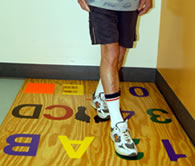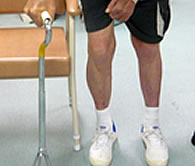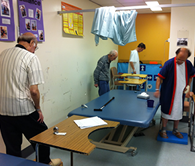Balance Workshop
Providing clear exercise guidelines to successfully improve balance and prevent falls
– a two-day workshop.

Why should people not use their hands for support when doing balance exercises?

Do walking aids prevent falls?

How can therapists help people to ‘challenge’ their balance while being safe?
The workshop is run over two days and accepts 24 registrants.
Target Audience: The workshop will be of interest to physiotherapists, physiotherapy assistants and other health professionals from hospital and community based settings who work with people with balance problems.
Pre-workshop worksheets will be provided to the organising group for distribution to participants.
General Information
This balance workshop has been developed following the work by Professor Cathie Sherrington and colleagues that provided clear exercise guidelines to successfully improve balance and prevent falls. Despite this evidence, implementing these guidelines in clinical practice continues to be a major clinical challenge. Therapists have asked the StrokeEd collaboration about how to implement effective balance strategies that are challenging, of sufficiently high dosage and safe. This workshop aims to assist clinicians to develop evidence-based solutions for people with balance difficulties.
Who can attend?
The workshop will be of interest to physiotherapists, physiotherapy assistants and other health professionals from hospital and community based settings who work with people with balance problems.
Objectives
At the completion of the workshop, participants should be able to:
Define
balance, postural adjustments, kinematics, kinetics, task specificity
Discuss
the research findings for the characteristics of postural adjustments i.e. timing, task specificity
Describe
the changes that occur to postural adjustments with aging and neuropathology
Describe
the assessment and analysis of balance
Describe
the risk factors for, and circumstances which lead to falls
Discuss
the evidence for exercise interventions to improve balance and reduce falls
Set up
effective balance training for people with impaired balance
Plan
a group balance class that challenges balance and provides a high intensity of practice
Presenters
Workshop Timetable
Day One
| Time | Topic | Format |
|---|---|---|
| 8.00 | Introduction | Lecture |
| 8.30 | Balance research | Lecture |
| 9.30 | Muscle actions in standing | Practical session |
| 10.15 | Morning Tea | |
| 10.30 | Postural adjustments | Lecture and practical session |
| 11.30 | Video analysis of balance | Small group work |
| 12.30 | Lunch | |
| 1.15 | Principles of training | Lecture, Video analysis |
| 2.30 | Afternoon Tea | |
| 2.45 | Analysis and training with patients | Clinical session |
| 4.00 | Discussion of clinical session | |
| 4.30 | Finish | |
Day Two
| Time | Topic | Format |
|---|---|---|
| 8.00 | Assessment of balance | Lecture |
| 8.30 | Effect of ageing and neuropathology on postural adjustments | Lecture |
| 9.00 | Falls – risk factors and circumstances | Lecture and small group work |
| 10.15 | Morning Tea | |
| 10.30 | Effective balance intervention | Lecture and small group work |
| 12.30 | Lunch | |
| 1.15 | Intervention – setting up a balance class | Practical session |
| 2.30 | Afternoon Tea | |
| 2.45 | Analysis and training with patients | Clinical session |
| 4.00 | Discussion of clinical session and goal setting | |
| 4.30 | Finish | |
Comments
Comments from our 2017 Calvary Balance Workshop:
Practical ways to implement training for different aspects of balance
Workshop was excellent.
Educators had a high knowledge of academic and practical application of neuro rehab
Practical philosophy of balance. What we can impact on and what is reversible
Revising balance assessment tools and really think of the implication of these tests
The greatest number of falls are due to uncontrolled centre of mass
First time there was a clinical session included into a course! It was brilliant



